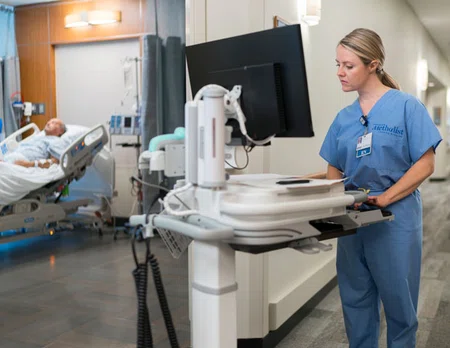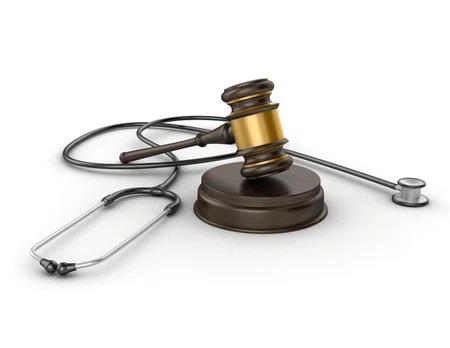© 2025. Houston Methodist, Houston, TX. All rights reserved.


In this
issue

WELCOME
NURSING SCIENCE
EDUCATION
PRACTICE

Nursing Documentation: Your Key to Safe and Effective Care

Nursing Documentation: Protecting Patients and Nurses
PROFESSIONAL DEVELOPMENT
MAGNET

Navigating the Legal Implications of Nursing in Achieving and Maintaining Magnet Designation

10th Annual Surgical Services Fair: A Milestone in Education and Teamwork
FROM OUR TEAMS

ABOUT DISCOVERN
PRACTICE
Nursing Documentation: Your Key to Safe and Effective Care
By Regis Meyer, PhD & Shannan Hamlin, PhD, RN, AGACNP-BC, CCRN, NE-BC, FCCM,Houston Methodist Hospital
By Regis Meyer, PhD & Shannan Hamlin, PhD, RN, AGACNP-BC, CCRN, NE-BC, FCCM,
Houston Methodist Hospital

Why do we document?
Medical records are legal documents that help us deliver safe, effective care and keep track of our patients' progress. As a Houston Methodist employee, it is your responsibility to document meticulously to ensure quality and safety in patient care and to comply with applicable laws, regulations and accreditation requirements.
In the event of a lawsuit, your documentation may also be the best protection we have to defend your care. Imagine this: You care for Patient X today and document your care in the medical record. Days go by, then weeks, then months and then years. During this time, you have cared for more patients than you can count. Finally, after almost two years, Patient X files a lawsuit against Houston Methodist, alleging you failed to monitor their condition correctly. Suddenly, you're in a legal battle regarding the care you provided years ago, and your documentation becomes your best ally.
This scenario underscores the critical importance of documentation. In lawsuits, the primary allegations against nursing staff can arise from various situations, such as failure to monitor, communicate, escalate, rescue, follow policies, assess, recognize changes, or document properly. These lawsuits can also lead to serious legal and professional consequences.
What If It’s Not Documented?
In a lawsuit, juries believe medical records because the documentation contained therein was made at or around the time the care was delivered. Anything not documented in the medical record will require you to rely on your memory. This can lead to several issues. Relying on memory can be tricky, especially years later. Also, it is very likely that your recollection will be different from the patient who filed the lawsuit. This means it will be up to the jury to decide who they believe, you or the patient. Without documentation, defending your actions in court becomes extremely difficult.
It is important to note that Secure Chats in Epic are NOT a part of the legal medical record, and all Secure Chat messages are purged from EPIC after 28 days. This means that anything you communicate to any other member of the care team in a Secure Chat WILL NOT be in the medical record and will be lost forever. For example, if you communicate a lab result or a worsening patient condition to a physician using Secure Chat WITHOUT also creating a nursing note or provider notification, then that chat will be lost, and you could be at risk of a lawsuit alleging you failed to communicate or escalate.
What Happens When There Is a Lawsuit?
When patients or their families believe that a healthcare provider failed to meet the standard of care, they may contact an attorney to pursue a lawsuit. In Texas, these are called “healthcare liability claims,” governed by Chapter 74 of the Texas Civil Practice & Remedies Code. When determining whether to file a lawsuit, the patient will obtain a copy of his or her medical records and share them with an attorney. That attorney will evaluate the case with particular attention to evidence of negligence and the damage model, meaning the amount of money the patient stands to “win” from the lawsuit. If the attorney decides to take the case, then that attorney will also hire experts to review the medical records and opine as to: (1) the applicable standards of care, (2) how the healthcare provider breached or deviated from that standard of care, (3) and how that breach or deviation from the standard of care caused harm to the patient.
Once the lawsuit has been filed, it is assigned to a Risk Attorney within the Houston Methodist Risk & Litigation Department. The Risk Attorney will review the lawsuit and work with the named hospital’s Quality and Guest Relations Departments to see if any grievances have been filed by the patient and to determine what reviews of the care have already been completed. The Risk Attorney then retains outside counsel to assist with the lawsuit and reaches out to the staff directly involved in the patient’s care to set up interviews and prepare you for a possible deposition.
For more information about the Houston Methodist Risk & Litigation Department, including what resources are available to you in the event of a lawsuit, please contact your hospital’s Risk Management Liaison or call 713-383-5100.
Best Practices in Documentation
Good documentation tells a straightforward, concise, and accurate story of the care provided to each patient. Stick to the facts and include subjective statements or patient and family comments in quotes. Record patient responses, who you called, what you discussed, and when. Document as soon as possible after an event and avoid pre-documentation. If you need to correct something, follow the policy. If a patient refuses treatment, medication, or to give a history, document it and inform the physician.
Wholly and accurately report and document the following:
- The patient’s status, including signs and symptoms
- Nursing care rendered
- Physician or other provider orders
- Administration of medications and treatments
- Patient responses
- Contacts with other healthcare team members concerning significant events regarding the patient's status
A good test to evaluate whether your documentation is satisfactory is to ask: If another nurse had to step in and take care of this patient, does the chart provide sufficient information for the seamless delivery of safe, competent, and ethical care?
Following these best practices can protect ourselves and our patients, ensuring a safe and effective healthcare environment. Remember, good documentation is your best defense!









